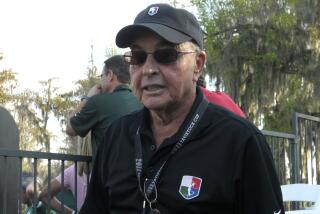Murder Evidence in Tylenol Case Told
WASHINGTON — U.S. Parole Commission examiners have recommended that Tylenol extortionist James W. Lewis serve his maximum 20-year prison sentence because they believe that evidence indicates he was responsible for the unsolved Tylenol murders in Chicago seven years ago, his lawyer said Wednesday.
Although he was convicted only of writing a letter demanding $1 million to stop the killings, law enforcement officials have suggested privately that Lewis was a suspect in the murders. The finding by the parole examiners is the first time that he has been identified officially as the probable killer.
Seven people died after swallowing Tylenol capsules laced with cyanide in the fall of 1982. The capsules were in bottles of the pain reliever purchased at different stores in the Chicago area.
The resulting nationwide scare cost Tylenol’s manufacturer, Johnson & Johnson, millions of dollars in lost sales, sparked at least 200 copycat incidents and led to tougher packaging standards for over-the-counter medicines.
The Justice Department and Parole Commission refused to confirm the recommendation by the commission examiners. Spokesmen for both agencies said only that Lewis’ Sunday parole date has been suspended pending a review of his case.
Chicago lawyer Donald V. Morano, who represents Lewis, said in a telephone interview that the conclusion that Lewis was the probable killer was delivered orally by the two examiners at a parole hearing Monday in El Reno, Okla., where Lewis is imprisoned.
“They said that they were recommending that he serve the maximum sentence because a preponderance of the evidence indicated that he was the murderer,” Morano said.
Although a criminal conviction requires evidence of guilt beyond a reasonable doubt, Justice Department spokesman Joseph C. Krovisky said that the less stringent “preponderance” standard is used in deciding parole eligibility. Krovisky said that preponderance means clear and convincing evidence.
If the recommendation of the examiners is upheld by the nine-member Parole Commission, Lewis will spend about seven more years in prison. He was convicted of attempted extortion for writing a letter in 1982 to Johnson & Johnson demanding $1 million to stop the killings. He was never charged with the killings, and they remain unsolved.
Lewis was sentenced to 10 years for attempted extortion and 10 years for an unrelated mail fraud conviction. He has been considered a model prisoner, and commission officials in March had approved a parole date of next Sunday.
However, the U.S. attorney in Chicago and one of the prosecutors in the extortion case wrote letters asking the commission to reconsider the decision.
U.S. Atty. Anton R. Valukas wrote that Lewis remained a danger to the public and had committed “one of the most heinous and despicable crimes that the Northern District of Illinois has experienced.” The letter did not accuse Lewis of the killings.
Former federal prosecutor Jeremy D. Margolis, now director of the Illinois State Police, said that his letter did not accuse Lewis of the killings and offered no new evidence on the subject.
Morano said that authorities are trying to keep Lewis in prison by suggesting he is the Tylenol killer because of their inability to solve the murders.
“They have wanted to pin the Tylenol killings on Lewis from the beginning, and he did not do it,” Morano said.
Since his capture after a nationwide manhunt in 1982, some investigators have believed Lewis was the prime suspect in the killings. During two sessions with then-prosecutor Margolis after his arrest, Lewis described how someone could have filled the Tylenol capsules with cyanide and then distributed them randomly at stores.
Lewis later said that he was merely recounting a process described to him by drug dealers he had met in prison.
More to Read
Sign up for Essential California
The most important California stories and recommendations in your inbox every morning.
You may occasionally receive promotional content from the Los Angeles Times.










